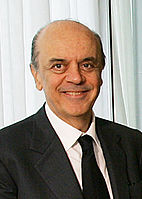Brazilian general election, 2002
|
|
|||||||||||||||||||||||||||||||
|
|||||||||||||||||||||||||||||||
|
|||||||||||||||||||||||||||||||
|
|
|||||||||||||||||||||||||||||||
| Presidential election results map after the second round of voting: Red denotes states won by Lula, and Blue denotes those won by Serra. | |||||||||||||||||||||||||||||||
|
|||||||||||||||||||||||||||||||
General elections were held in Brazil on 6 October 2002, with a second round on 27 October. After three failed attempts, Workers' Party leader Luiz Inácio Lula da Silva succeeded in a presidential election. Nevertheless, he did not manage to obtain the majority of valid votes in the first round; this led the presidential election to a second round, which Lula won with 52.7 million votes (61.3% of the total), becoming at the time the second most voted-for president in the world, after Ronald Reagan in the 1984 United States presidential election.
During the second term of the Fernando Henrique Cardoso administration, a serious economic crisis began in Brazil as an impact of the 1997 Asian financial crisis. Commencing shortly after the 1998 elections, when Cardoso was re-elected, as a currency crisis, it resulted in a decrease in growth and employment rates and a rise in public debt. In an environment of distrust and uncertainty for investment, many investors feared the measures that were going to be taken if a left-wing candidate won the election. As a matter of fact, when Lula would rise in the polls, the so-called "Brazil risk" index, which measures the confidence of investors in the country, would also rise. The media called this the "Lula risk", indicating that if Lula was to win the election, the economy would fail. Lula was then forced to sign a text that became known as Carta aos Brasileiros (Letter to the Brazilian people), promising that if he won the election, he would not change the economic policy of Brazil. Many in the left-wing saw this as a shift to the center from Lula and his Workers' Party, which openly defended a transition to socialist economy in the 1989 presidential election.
...
Wikipedia



